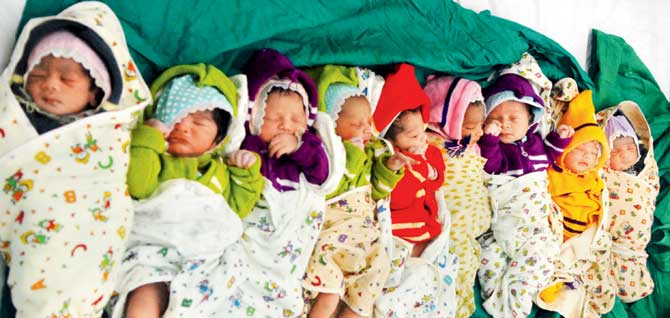According to data sought exclusively by mid-day from BMC, over 13 infants die every day in Mumbai — a number that is higher than the average track deaths recorded every day

 Delay in providing treatment to infants often leads to health complications, which could prove fatal. Representational Pic
Delay in providing treatment to infants often leads to health complications, which could prove fatal. Representational Pic
ADVERTISEMENT
Mumbai has a grave situation on its hands. As many as 4,934 children die every year in the city before their first birthday. According to data sought exclusively by mid-day from the civic administration, 29,609 infants (aged 0-1) died in the city from 2010-15. Simply put, over 13 infants die every day in the city — a number that is higher than the average track deaths (9) recorded in Mumbai every day.
From 2010-15, Mumbai registered 5,54,965 deaths (3,26,753 males and 2,28,212 females). Of these 29,609 (16,154 boys and 13,455 girls) were infants.
Don’t ignore diarrhoea
Dr Kiran Coelho, head of the department of gynaecology, Lilavati Hospital, says diarrhoea is the most common cause of death in the age group of 0-4. Besides, parents often don’t consult paediatricians for, what they deem, minor illnesses. “All children under the age of 5 should be taken only to paediatricians for treatment. Besides, an incomplete course of treatment could lead to drug resistance, which could hamper child’s health further. Also, mothers often don’t breastfeed properly, which weakens the child's immunity,” explains Coelho.
Dr Mukhesh Agarwal, head of the department of paediatrics, says respiratory infections, too, are a leading cause of death among infants. Besides, delays in treatment can cause health complications. “We often get patients who arrive at the last stage of an illness. Infants are unable to express their problems. So, we have to collect information from secondary sources like parents. A general physician will not be as qualified as a paediatrician to diagnose an infant’s problems. Even a small misdiagnosis can prove fatal in the case of infants,” he said.
Girls have it worse
But the high infant mortality rate is not the worst news. Female infant mortality in the city stands at 5.89%, as against 4.94% among boys. Doctors and activists believe that a gender bias in caring for the girl child contributes largely to this, be it sanitation, nutrition, breastfeeding or vaccination/immunisation.
Dr AL Sharada, director of NGO Population First, says the odds are often stacked against girls, right from the stage of infancy. "In our society, boys are still given preference over girls." She explains that often when a boy takes ill, the ‘response time’ from family members is faster as compared with the treatment of girls.
Referring to the alarming infant mortality data, she feels that “in nearly 60% of the cases, it would have been a child from slum areas succumbing to an illness”. She suggests that the BMC undertake programmes, especially in slum areas, to tackle infant mortality.
Dr Vipil Salgia, a radiologist from South Mumbai, attributes the high female infant mortality rate to a combination of poor nurturing and a discrimination against the girl child.
Finding a solution
Vidya Thakur, minister of state for women, child and rural development, however, is not aware of the grim situation. "I will have to check with the authorities before making any comment on the issue," she told mid-day.
BMC's health department officials did not repsond to mid-day’s calls.
Former Health Minister Suresh Shetty says the problem also lies with the BMC and the state government’s sole focus on child sex ratio (number of girls per 1,000 boys in the age group of 0-6). “Merely focusing on improving the child sex ratio is not enough. There is need for a system that monitors the growth of newborns, especially girls, till the age of 5,” he suggests.
 Subscribe today by clicking the link and stay updated with the latest news!" Click here!
Subscribe today by clicking the link and stay updated with the latest news!" Click here!






